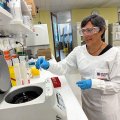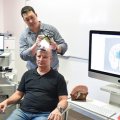The University of Queensland has set its sights on becoming the university of choice in Australia for women in engineering, with a major industry partnership announced today.
The partnership between the University, Rio Tinto, the Australian Power Institute (API), and the Australian Petroleum and Exploration Association (APPEA) will address the shortage of female students enrolling in engineering programs at UQ through the creation of a unique position dedicated to improving this gender imbalance.
UQ Faculty of Engineering, Architecture and Information Technology Executive Dean Professor Graham Schaffer said both the University and the engineering profession will greatly benefit from a more equitable gender balance of qualified engineers.
“Quality is enhanced by diversity. At UQ, we are proud to be working towards a more equitable balance of male and female engineers, which will greatly benefit the University and the engineering profession,” Professor Schaffer said.
Rio Tinto, API, and APPEA are leaders within the engineering industry, and have each invested $250,000 over five years, providing UQ with the financial support needed to increase female enrolments.
APPEA Chief Operating Officer Eastern Region, Rick Wilkinson, said the proportion of degree qualified female engineers in the Australian labour force last year, was just 12.7 per cent.
“That figure needs to rise. Female engineers are an essential part of any technical team if it is to have the full depth required to compete in today’s globally competitive markets,” said Mr Wilkinson.
Currently, the national average for female students commencing study within engineering is 12-14%.
In comparison, 19-20% of the first year engineering cohort at UQ are female.
“Although UQ is already above the national average for undergraduate female engineering enrolments, we know that we are not at world’s best practice and that there is still much to be done,” Professor Schaffer said.
“Our data shows that female students, on average, have higher retention rates once they have commenced their engineering degrees in comparison to their male peers.”
“The challenge we face as an educational institution is therefore the recruitment of women into engineering programs, not retention.”
Chief Executive Officer of API, Michael Griffin said the partnership with UQ will provide the ‘best practice model’ for other universities, both nationally and internationally, to follow.
“UQ is leading the way in ensuring that a previously untapped resource is realised to its full potential,” Mr Griffin said.
“The University will share its processes and resources developed through this program with other universities, in order to promote engineering to young females, with the objective of increasing the proportion of women in engineering on a national basis.”
Already receiving state and national accolades for their recruitment approach towards women in engineering, Rio Tinto have furthered their commitment through this partnership.
Rio Tinto Energy Vice President Human Resources, Rosemary Fagen, said diversity and inclusion were great attributes to pursue in any organisation.
“Rio Tinto has a global target to increase the number of female professional engineers across the Group,” Ms Fagen said.
“We look forward to seeing improvement in the gender balance of qualified engineers as a result of this initiative with UQ,” she said.
UQ are currently seeking applicants for the Women in Engineering Development and Communications Manager position, focusing on recruiting, supporting and recognising women in engineering.
For further information, please view the position description here.
Media: Trent Leggatt (3346 9976 or t.leggatt@uq.edu.au.
.jpg)










